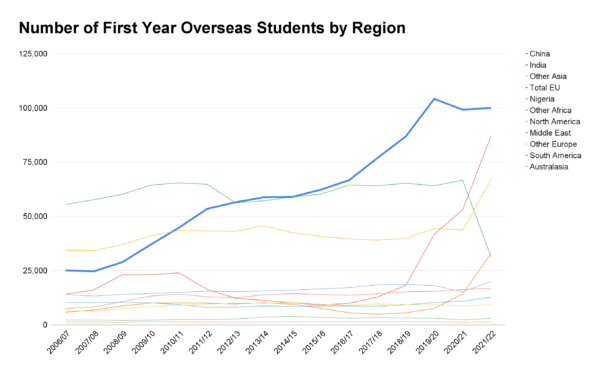For around £150, a Chinese student in the UK can buy a 2,000-word essay, and for £27.5 per hour can have an impostor attend Zoom classes on their behalf, a Chinese agency said.
The agency is one of many such essay mills, which, despite being outlawed in England and Wales two years ago, are still a thriving industry.
Academic integrity experts told The Epoch Times that students in the UK are still targeted by essay mills, many of which are operating from overseas, and some are specifically aimed at foreign students whose native languages are not English.
They also said a small number of foreign agencies recruiting students for British universities have been found running essay mills in parallel, compromising the value of British education.
Thomas Lancaster, senior teaching fellow in computing at Imperial College London, said it’s time for educational governing bodies to start pushing for the the Skills and Post-16 Education Act 2022 to be used in England and Wales, and that universities need to engage students and do more checks on agencies.
Mr. Lancaster, along with his colleague Robert Clarke, is known for popularising the term “contract cheating,” which means the outsourcing of accessed student works to third parties.
Students who commit contract cheating can be caught in a number of ways. Teachers may spot inconsistencies in students’ submitted work and their usual performance, they can also be reported by fellow students or essay mills which tried to blackmail them.
Robin Crockett, academic integrity lead at the University of Northampton, said he had seen a surge in contract cheating around a decade ago, with an increase in cheaper essay mills overseas, and when universities fees in England increased to up to around £9,000.
Mr. Crockett said he has caught students of “pretty much every nationality” and said the proportion of students caught over academic misconduct is similar among domestic and foreign students.
Little Change
In 2022, the Skills and Post-16 Education Bill became law, making it a criminal office to provide, facilitate, or advertise contract cheating services in England and Wales.Mr. Lancaster and Mr. Crockett said they are not currently aware of any prosecutions under the law, with the latter suggesting that limited policing resources may have played a role.
“If I think I find an essay mill that is operating in England, I contact the local police force ... they might or might not investigate,” he said.
Mr. Lancaster said he knows the law “has caused some companies to reconsider their operation,” and that there appears to be a reduction in the number of advertisements, but he believes there are still “plenty of smaller companies” remaining in the jurisdiction “who are feeling they can just stay hidden under the sand.”
“I do think it’s the right time for some of the educational governing bodies to start to push for the law to be used in more situations like this,” he said.
Chinese Essay Mills
A Google searching of keywords such as “essay help” leads to pages of advertisement, and many advertisements are in foreign languages, such as Chinese.Chinese students represented the largest group of foreign university students in England in recent years, according to data from the Higher Education Statistics Agency.
Asked about Chinese students in British universities, Mr. Lancaster said there’s “a perception that Chinese students are heavily represented in the overall case numbers for academic misconduct cases,” but that’s expected because there are many Chinese students studying in the UK.

Chatting to their clients on Chinese social media platform Wechat, agents would offer quotes according to the clients’ needs and task ghostwriters with assignments.
Prices vary depending on the length, difficulty, timeframe, and quality of the works required. One of the agency offered an Epoch Times reporter, who posed as a client, a 2,000 word essay on international trade for £150, or £177 when asked to contract a native English speaker from the UK.
The company’s services also include taking tests or classes for clients.
For an eight-hour Zoom class on leadership skills, the reporter was initially quoted around £720 (camera on). After one round of haggling, the price came down to £220 (camera off) or £387 (camera on).
In China, a surveyed of 318 students in 2015 found that almost a third (31.13 percent) of respondents had considered using ghostwriters, and 73.9 percent had known someone involved in contract cheating, according to China Youth Daily, which is affiliated to CUMU, an association of Chinese university publications which conducted the survey.
Data from the United States show that in the small proportion of Chinese students dismissed from universities in recent years, academic dishonesty was the primary reason for dismissals, according to annual reports published by education agency WholeRen, whose clients are Chinese students studying in English-speaking countries.
The figure grew steadily since WholeRen began publishing its annual report in 2014, when 21.4 percent of the dismissals of Chinese students were due to academic dishonesty. It jumped to a peak of 77.8 percent in the year ending March 2021.
In March, Michelle Shipworth, an associate professor at University College London (UCL), who said she had been removed from a course following complaints, including over her role in getting two Chinese students expelled for cheating over the years, told The Epoch Times that most Chinese students she had taught were keen to learn.”
She also claimed that university managers often didn’t want to hear about concerns about cheating among foreign students “because so many universities are dependent on overseas student funding” in an interview with The Telegraph at the time.
Unscrupulous Agents
Commenting on foreign essay mills, Mr. Crockett and Mr. Lancaster also said a small number of agencies that recruit foreign students for universities were found running essay mills in parallel so they can earn extra commissions.“We can’t keep sending university staff out to these countries to do the recruitment. At the same time, it’s always disheartening that a small number of agents are breaking the rules there, recruiting students purely for financial return as opposed to making sure they’re getting placed on the students on the course that is most appropriate for them,” Mr. Lancaster said.
“I do feel that some more checks on agents are needed, not just when an agent is first recruited to work with the university, but continually as that relationship develops as well, because agents can be subjected to many of the same temptations as everyone else in the world,” he said.
Asked what else can be done about contract cheating, Mr. Lancaster said universities can think more about helping students to understand the importance of ethics and integrity and keeping assignments interesting and valuable in an AI driven society.
Asked about artificial intelligence, experts said some universities have decided to allow the use of AI as long as the usage is declared, since students will need to know how to use the technology in the future workforce, while others believe students would benefit from being able to produce work without aid from AI, but it’s too early to tell how it will affect the business model of essay mills.







